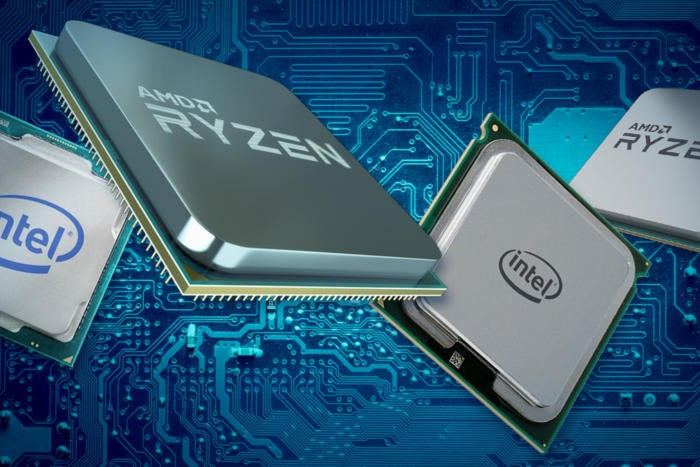The best CPUs for gaming
Buying a processor for a gaming rig isn’t as hard as it used to be. Now that Ryzen 5000-series and Intel’s 11th-gen Core CPUs come with more performance and cores than ever before, it’s hard to buy a stinker these days—especially because most games favor graphics firepower over CPU oomph. All that said, there are specific chips that stand out from the horde as the best gaming CPUs due to their price, performance, or nifty extras.
Whether you’re on a budget or willing to pay for sheer face-melting speed, these are the best CPUs for gaming PCs that you can buy.
Editor’s note: We constantly updated this article as necessary. The latest iteration adds various tidbits to the news section below.
Latest gaming CPU news
- It’s not related to desktop gaming, but Intel just released its hotly anticipated 11th-gen Core “Tiger Lake H” processors for gaming and production laptops, and they deliver massive improvements over their 10th-gen predecessors. Check out our Core i7-11800H and Core i9-11980HK performance reviews for all the nitty-gritty details on how these chips stack up against AMD’s awesome Ryzen mobile processors.
- Back in desktop land, CPUs are seeing some of the same shortages that have been plaguing graphics cards in recent months, leading to low availability and higher prices of many AMD Ryzen processors in particular—especially at the high end. Fortunately, supply is becoming more available for the Ryzen 5 5600X and Ryzen 7 5800X, and there’s hope on the horizon for the Ryzen 9 5900X too.
- After a two-year drought, modern versions of AMD’s ultra-popular Ryzen APUs are on the horizon. The Ryzen 5000G series wields significantly faster Radeon graphics and up to twice as many Ryzen cores than before, but they’ll come to prebuilt systems first before launching in DIY retail form later this year. Our guide to everything you need to know about Ryzen 5000 can help you wrap your head around AMD’s APUs and CPUs alike.
- Intel’s latest chips are here now, and while the 11th-gen “Rocket Lake” Core processors are still built on the ancient 14nm manufacturing process, the architecture itself is built from the company’s newer 10nm “Ice Lake” cores. It’s an interesting, perhaps desperate idea that yielded mixed results, as you can see in our Core i9-11900K review and suggestions below.
- The performance-boosting PCIe Resizable BAR feature continues to become more widely available after debuting in the form of AMD’s Smart Access Memory. AMD introduced the feature with Ryzen 5000, but it has since spread to Intel’s newer Rocket Lake chips. BIOS updates are adding it to older processors and motherboards from both chipmakers, though you shouldn’t expect the feature (or any Ryzen 5000 support) to extend back to AMD’s older x370 motherboards.
The best gaming CPU for most people
Intel Core i5-11600K ($270 on Amazon)
Midrange CPUs are the sweet spot for PC gamers. In fact, if you don’t need the additional cores of pricier CPU options, this class of chip offers essentially the same gaming experience of processors that cost hundreds more. The bigger question is: Intel or AMD? The answer is complicated.
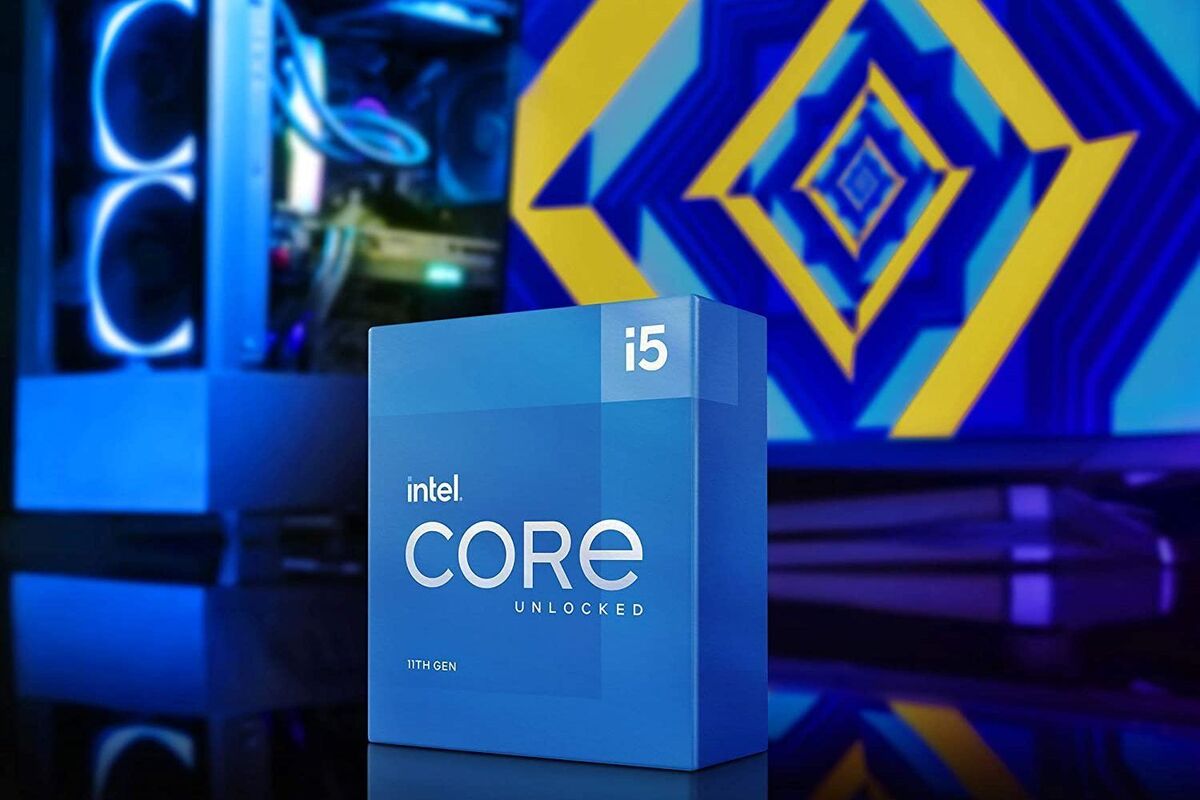 Intel
IntelAfter a decade of Intel dominance, AMD came back with a vengeance in recent years. Its Ryzen 5 2600 and 3600 offerings conquered mainstream gaming. The company’s newer 6-core Ryzen 5 5600X delivers killer gaming speed for the class and solid productivity results. However, Intel’s solid Core i5-11600K earns our nod for two simple reasons: price and availability.
AMD raised prices by $50 over previous generations for the Ryzen 5 5600X thanks to its newfound gaming supremacy, then got hit by the same semiconductor shortages and logistics woes plaguing the GPU industry. Supply of the chip has been hit and miss since its November launch, though it’s finally starting to loosen up. When you can find it at retailers, it’s usually going for $350 (or more!) rather than its $300 MSRP.
Enter Intel’s $270 Core i5-11600K. Launched in late March, it offers the same 6 cores and 12 threads as the Ryzen 5 5600X and top-notch gaming performance, per reviews from TechPowerUp, Tom’s Hardware, and PC Gamer. It doesn’t win every battle—the Ryzen chip comes out slightly ahead on average in TechSpot’s gaming tests—and Intel’s aging 14nm process makes the 11600K less power-efficient than AMD’s 7nm 5600X. Still, the chips offer effectively similar experiences, especially at the higher visual settings and resolutions that most PC gamers play at. They’re both excellent.
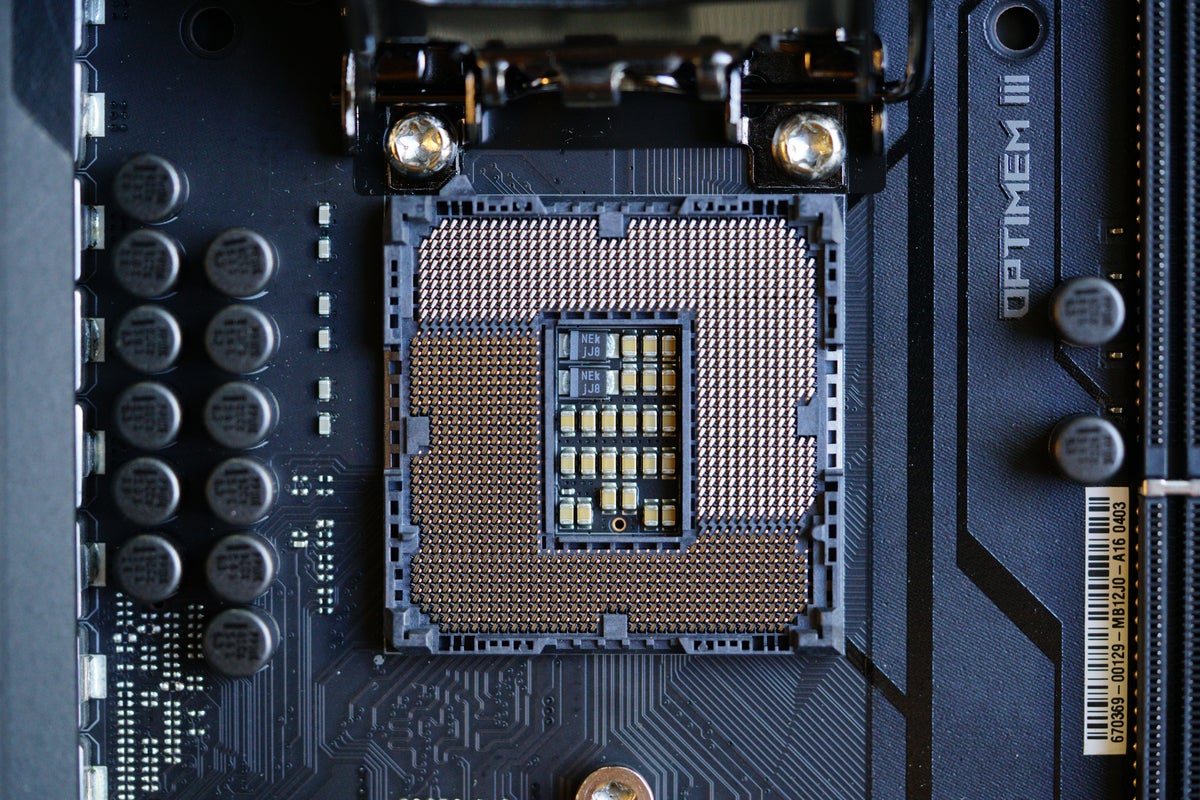 Gordon Mah Ung
Gordon Mah UngA motherboard with an LGA1200 socket is required to run a 10th- or 11th-gen Intel Core CPU.
We’d give the AMD chip the nod in a world where parts flowed freely, but the Core i5-11600K’s $80-plus price advantage gets our recommendation in today’s market. Note that you’ll need to buy a cooler for it, however, while AMD’s Ryzen 5 5600X comes with one bundled. You may want to factor that into your buying decision if you aren’t dead-set on outfitting your chip with a nice third-party cooler.
If you don’t mind giving up PCIe 4.0 support and a wee bit of potential speed, give last generation’s Core i5-10600K a long, hard look. It’s another 6-core, 12-thread, highly clocked gaming chip, and currently you can find it going for just $230 on Amazon and other retailers. That’s a great price for a good chip, especially if you plan on playing at 1440p or 4K resolutions, where games become more GPU-bound than CPU-bound.
The best high-end gaming CPU
AMD Ryzen 9 5900X ($550 on Amazon or Newegg)
To repeat: Modern Core i5 and Ryzen 5 chips with six cores deliver nearly the same levels of gaming performance as pricier processors. You only need to step up to a high-end gaming CPU if you need more cores for productivity tasks, want eight cores for streaming or future-proofing against console hardware configurations, or simply demand the absolute fastest potential frame rates in any situation.
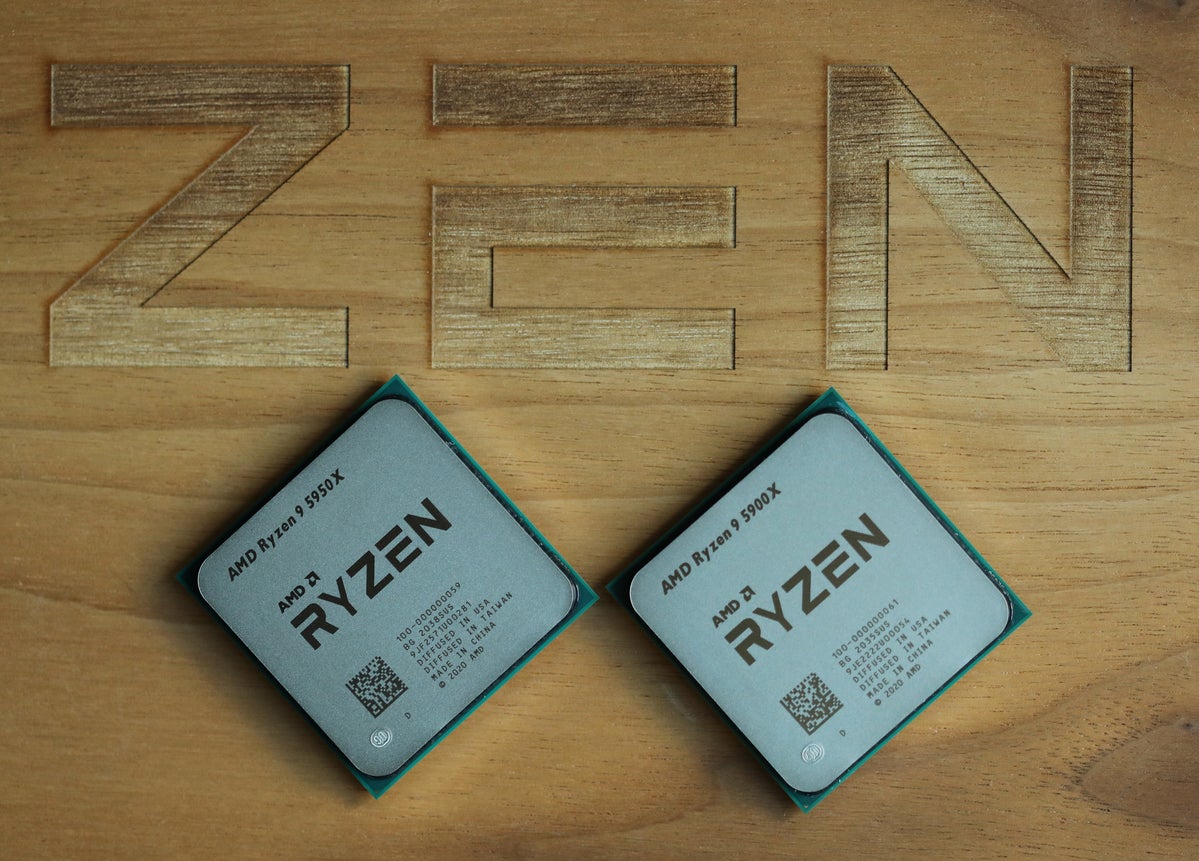 Gordon Mah Ung
Gordon Mah UngIf you’re in the market for a high-end gaming processor, the Ryzen 9 5900X ($550 on Amazon or Newegg) is the best option available. It offers no-compromises gaming performance on a par with Intel’s new 8-core Core i9-11900K flagship, but significantly more productivity performance thanks to the Ryzen chip’s 12 cores and 24 threads. This can handle anything you throw at it, and then some—that’s why we called it “the best consumer CPU we’ve ever seen” in our review.
The step-up $750 Ryzen 9 5950X offers even more performance, thanks to its whopping 16 cores. That’s overkill for most people, though, and its gaming performance isn’t fundamentally faster than the 5900X’s.
Intel’s Core i9-11900K costs $550, so it’s priced the same as AMD’s Ryzen 9 5900X, though we’re seeing it going for roughly $615 on the streets in Rocket Lake’s early days of availability. It’s very power-hungry and not appreciably faster than AMD’s chip. It also lags far behind in productivity tasks, as the Core i9-11900K comes with only 8 cores and 16 threads. In fact, Intel’s chip performs more comparably with the 8-core Ryzen 7 5800X, which carries a $450 retail price.
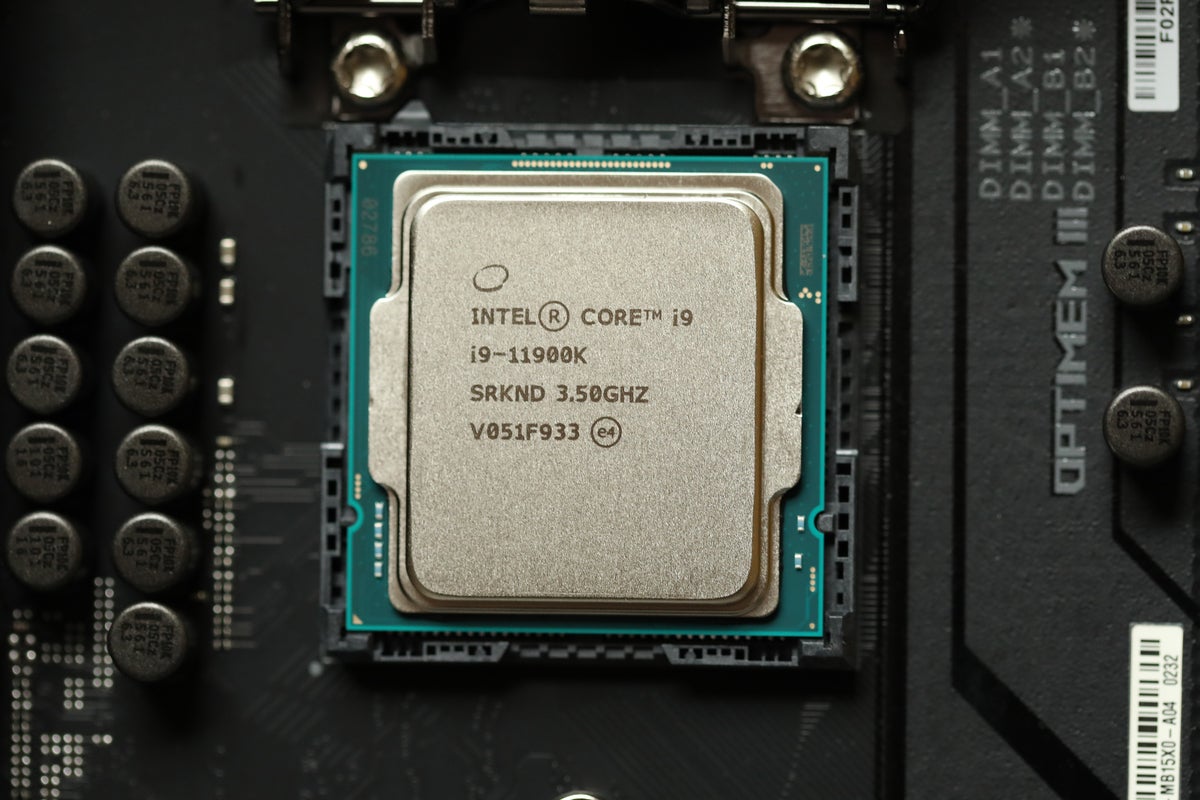 Gordon Mah Ung
Gordon Mah UngIntel’s Core i9-11900K.
We can’t recommend Intel’s 11th-gen Core i7 or Core i9 chips given those facts, even though they’re great gaming CPUs in a vacuum. The high-end Ryzen CPUs have been subject to even more extreme pricing volatility than the midrange 5600X, and the Ryzen 9 chips often sell for hundreds of dollars more in the real world. If Intel is able to keep 11th-gen chips in stock and AMD can’t step up, that will make the 11900K more appealing. As we said, though, it’s more comparable with the Ryzen 7 5800X, and availability of that chip at MSRP is much more reliable. Go with AMD if you can.
You might consider Intel’s older 10th-gen Core processors, if you don’t mind giving up PCIe 4.0 support or Rocket Lake’s vastly improved integrated graphics. The 11900K is more of a side-grade or even a downgrade to its predecessor, offering two fewer cores and only slightly faster gaming performance than the last-gen 10900K. The former flagship is hard to come by now, but the step-down Core i9-10850K remains widely available, with 10 cores and just 100MHz lower top speeds than the 10900K.
Better yet, you can buy one for just $380—meaning it offers more cores for less money than either AMD or Intel’s current 8-core offerings. The 10850K is a screaming value while it lasts, and we’ve seen it as low as $330 if you don’t mind heading into your local Micro Center.
The best budget gaming CPU
Intel Core i5-10400F ($152 on Amazon)
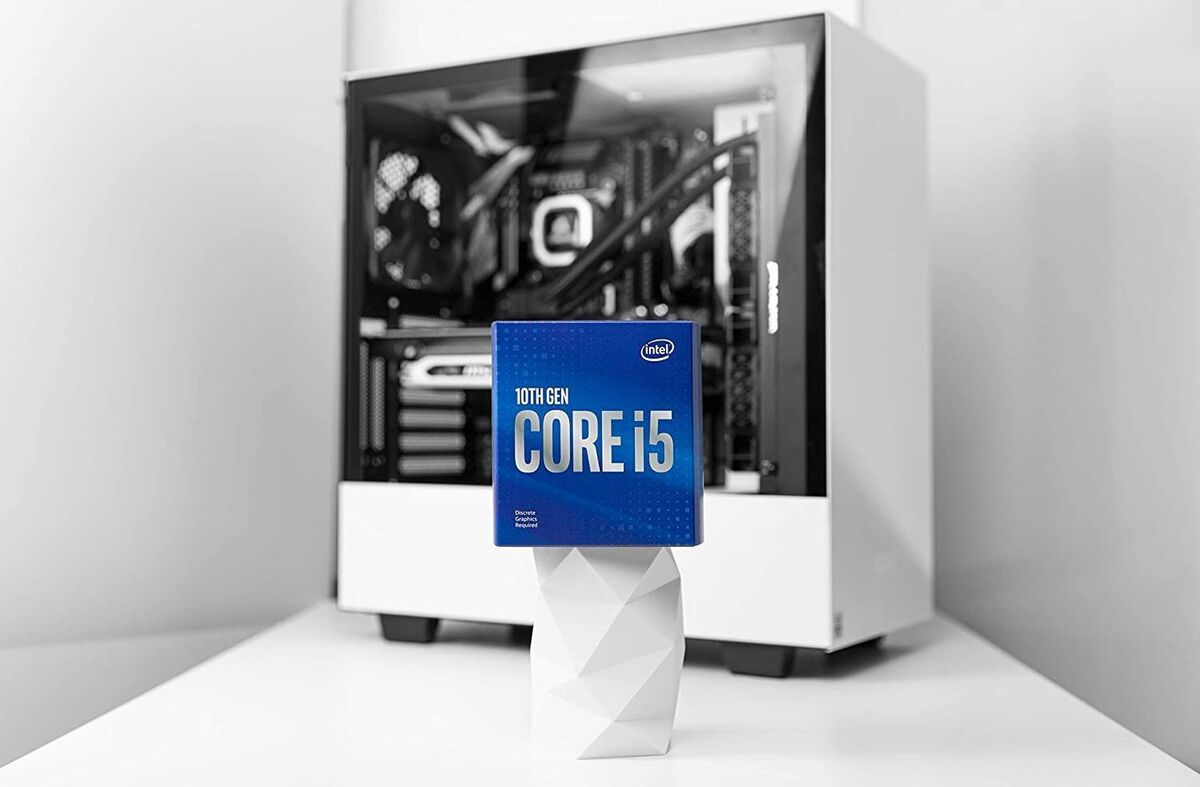 Intel
IntelUsually, we recommend AMD’s Ryzen APUs (like the Ryzen 3 3200G) for budget builders. These chips costs between $100 and $150 and come with integrated Radeon graphics that let you get game without a graphics card if you don’t mind dialing back your visual quality or resolution. Unfortunately, AMD hasn’t released a new APU since the 3200G’s introduction in mid-2019—though new Ryzen 5000G chips will arrive later this year—and that chip has all but disappeared in today’s weird world of silicon shortages.
If you’re a gamer on a tight budget and already have a graphics card, consider Intel’s last-gen Core i5-10400F first. This 6-core, 12-thread chip costs only $152 now and comes with a cooler in the box. It offers the same thread count as rival Ryzen 3000 options and similar-to-better gaming performance, per TechSpot and TechPowerUp reviews, though it lags the K-class Core i5 chips by double-digit percentages in CPU-bound games. The newer processors in our “Best gaming CPU for most people” section also smoke it, though if you’re playing with higher visual settings, you’ll feel it less—especially at higher resolutions.
The “F” denominator in “Core i5-10400F” means it lacks an integrated GPU, however, so a graphics card is necessary. If you want to game without a graphics card, consider the new Intel Core i5-11400. The Core i5-11400 includes Intel’s vastly improved Xe integrated graphics (which can actually game with compromises!) and Rocket Lake’s various other improvements (like PCIe 4.0 support) for $184.
Gamers Nexus reviewed the Core i5-11400 and says it’s a good, affordable part for people who have no plans to overclock and don’t mind losing a few percentage points in gaming performance in exchange for a much lower price. The 11600K is a better option if you do content creation on the side thanks to its faster speeds though.
Optimum Tech, meanwhile, reviewed the Core i5-11400F (with no integrated graphics) and called it “the ultimate value gaming CPU that you can buy right now,” though he notes that you’ll want to ditch the stock cooler and upgrade to even an affordable third-party cooler to get the most performance out of the chip.
“If want to get the most performance that you can out of it, even a single-tower air cooler will let you run the full power and boost clocks that are on offer here.” Something like the legendary Cooler Master Hyper 212 Evo should do the trick for around $30. Opting for our recommended Core i5-10400F and sticking with the stock cooler can get you most of the performance for around $60 less than the 11400F with a Hyper 212 costs, however.
Cheaper AMD options like the $100 Ryzen 3 3100 and $120 Ryzen 3 3300X would contend for this title if they truly sold for their asking prices, but the processors have been almost impossible to find since their debut. Currently, both are going for well over twice their MSRP, making Intel’s options the better buys.
For all the latest Technology News Click Here
For the latest news and updates, follow us on Google News.

